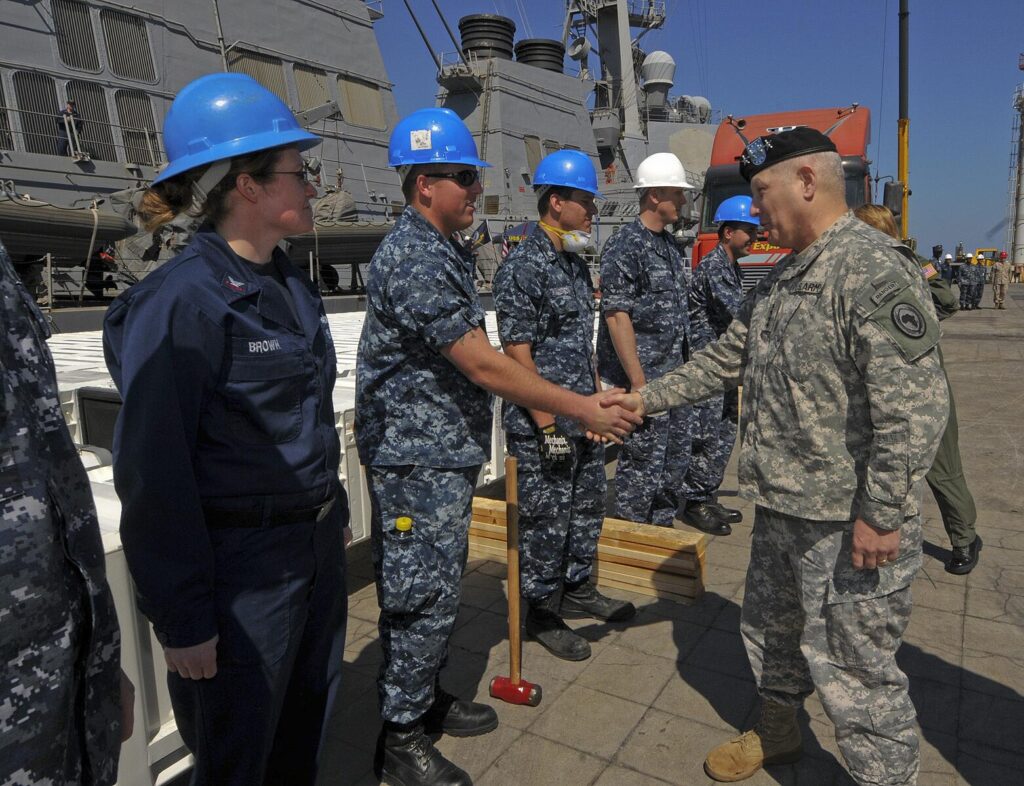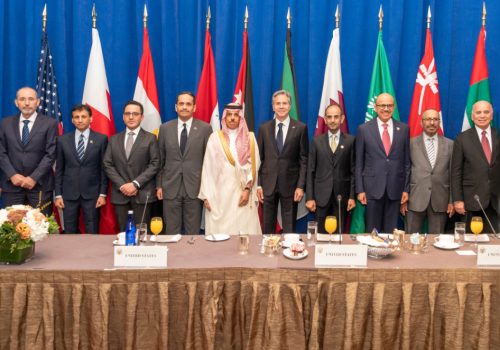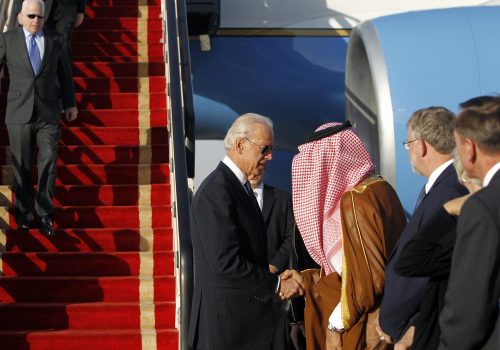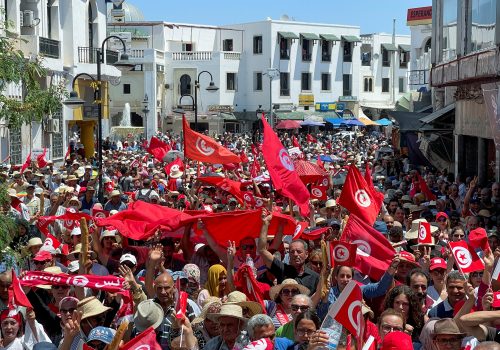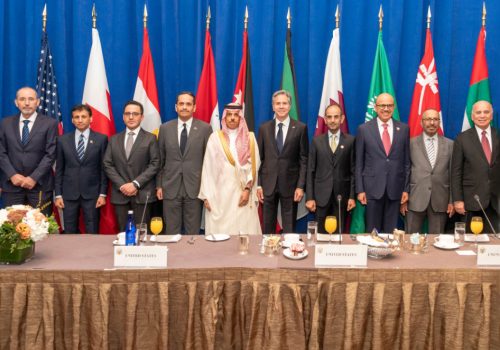
After 2011, the United States stayed on the sidelines—to Libya’s detriment
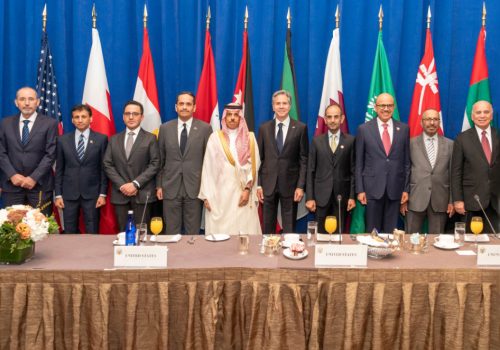
In the previous volume on foreign actors in Libya, I divided U.S. involvement into five stages, including the intervention itself, the immediate post-conflict period, and the aftermath of the tragic death of Ambassador Chris Stevens in Benghazi. As is well documented, Ambassador Stevens’ death created a long-lasting political firestorm starting in the 2012 election year and was revived by targeting Hillary Clinton in 2016 for her alleged responsibility as secretary of state at the time, even though she was exonerated in a Republican-led Congressional select committee report. This disincentivize investing political capital or risk in Libya’s stability. Just as President Obama saw the post-intervention period as primarily a European problem, the United States continued to be risk averse when it came to investing in Libya, demonstrated most clearly by the withdrawal of the U.S. embassy during the early stages of 2014-2015 civil war. The embassy became the Libya External Office based in Tunis after a brief stint in Malta. Ten years later, the Biden administration is working with Congress to restore an initial presence in Tripoli, whereas most countries returned their embassies over the last several years.
When reflecting over the last decade of the U.S. policy, especially in the Trump and Biden administrations, three consistent trends emerge (though to different degrees): insufficient support for the UN political process to restore legitimacy to Libya’s political; leadership, repeated appeals to eastern warlord and head of the Libyan National Army (LNA) Khalifa Haftar to participate in a political process; and most consequentially for the United States, a seeming lack of attention to Russia’s increased presence in Libya.
Libya will never be at the top of the agenda for the United States in the Middle East, let alone for the rest of Washington’s foreign policy agenda. However, through a higher degree of attention and engagement, the United States can make significant inroads toward stability in a country that has the potential to benefit its neighbors and the region through proper management of its oil wealth, investing billions of dollars still frozen from the Qaddafi era, and preventing Russian expansion in the wider area.
Insufficient Political Engagement
The Skhirat Agreement or the Libyan Political Agreement (LPA) tried to end the 2014-2015 civil war between Haftar’s Dignity operation and the Dawn Coalition consisting mainly of militia groups around Misrata and Tripoli. Instead, the overall split of Libya remains mostly between Haftar (addressed below) and political survivor Aguila Salah in the east and the UN-recognized pseudo governments and armed groups in the West. The LPA created two chambers: the legislature, the House of Representatives (responsible for making laws) based in Tobruk, and the High State Council (HCS) based in Tripoli. The HSC has a consultative role, but its legal role was never completely spelled out. The UN appointed Fayez Sarraj as prime minister. Among other factors, Haftar’s refusal to accept that the military would be under civilian control, as stipulated in the LPA, effectively nullified one of its most important elements.
For the following years, the international community tried to forge a consensus by holding summits in Europe: including in France in first in 2017, 2018, then in Italy in 2018. These conferences elevated Haftar from a renegade general to an international statesman on par with Sarraj. Despite the presence of foreign heads of state, none of these summits resulted in an agreement to implement the LPA or to adopt a process for elections. After another civil war broke out in 2019, German Chancellor Angela Merkel hosted an international conference on Libya in Berlin in January 2020 intended to halt the violence. When a ceasefire finally occurred in October 2020, the UN created the Libya Political Dialogue Forum, whose members chose a President and prime minister, Mohamed Menfi and Abdel-hamid Dbaibah. The Dbaibah government was supposed to implement elections at the end of 2021. The elections were delayed for a number of reasons yet Dbaibah remains prime minister of the Government of National Unity three years after his initial appointment and Haftar still controls of the East.
In this context, the U.S. stood mostly on sidelines, attempting to establish some progress between Sarraj and Haftar through direct meetings and attending the European meetings at a ministerial level or below. What the U.S. can always do, however, is pressure foreign actors, or “spoilers,” who support competing sides on the Libyan political spectrum to reach consensus. At different times, the U.S. could have pressed Egypt, the UAE, France and Turkey, Qatar, and Italy to weigh in with their own Libyan allies to accept political compromise. The problem with organizing a coordinated and effective diplomatic effort is that Libya is routinely far down on the “call sheet” for senior level engagements and there’s usually more pressing issues in the bilateral relationships with the above states than Libya. Without the necessary backing from the White House or Secretary of State a special envoy can be easily ignored.
The one positive thing the United States did in was to develop a new set of sanctions in 2016 targeting individuals that “threaten the peace, security, or stability of Libya, including through the supply of arms or related materiel.” Agulia Salah was named as the first target as well as western militia leader Salah Badi. However, because Salah had no U.S. bank accounts to be frozen and had not ambitions to travel to Washington, the sanctions on him were symbolic and European partners allowed him to travel and participate in conferences. Applying the sanctions to Haftar would have been a different story.
Overestimation of Haftar’s Influence and Value
General Khalifa Haftar emerged not during but after the 2011 revolution. Positioning himself as an anti-Islamist, he appeared as an alternative force to the growing influence of Islamist militias, who were killing individuals, whether they were members of the brutal security establishment or nonideological judges. Eventually he defeated the extremists in Benghazi and turned his sights on Derna, which hosted a strong Ansar alSharia presence. With the support of anti-Muslim Brotherhood countries such as Egypt, the UAE, and, to a certain extent, France, his domination over the so-called Libyan National Army grew. But the Obama administration who distinguished between political Islamists, like Tunisia’s Rachid Ghannuchi, and militant Islam, bristled at statements calling all Islamists terrorists. The war ended in a standstill and UN Special Representative Bernadino Leon forged the LPA, leaving the international community pressing Haftar to accept a temporary government and placing the army under civilian control, effectively giving him a veto over any political compromise.
As Haftar became implacable, he had the temerity to attack Tripoli the day Secretary-General Guterres was visiting to help launch his Special Representative Ghassan Salame’s national dialogue. If there ever were a reason for sanctioning someone for threating the “peace and stability” of Libya, this was clearly it. But the United States chose not to, and Haftar benefited from the support of Syrian, African, and most importantly, Russian Wagner Group mercenaries who almost succeed in capturing Tripoli. There continues to be a debate about what former National Security Advisor John Bolton told Haftar during the run-up to the war and whether he gave Haftar a “green or yellow light” to attack if he could take Tripoli quickly. Regardless, the war dragged on, and the United States ignored the consequences.
Shortly after the October 2020 ceasefire, the UN created the Libya Political Dialogue Forum. Seventy-Five members of Libyan society discussed future political issues and selected a temporary prime minister who would govern until national elections at the end of 2021. Abdul-hamid Dbaibah won a surprising if not controversial victory over Aguila Salah. Haftar once again played spoiler by taking various positions on the legality of a military presidential candidacy – one of the key issue blocking elections.
As elections moved into an indefinite delay, the United States (along with its allies) tried to engage with Haftar in an effort to get him to cooperate on the possibility of holding national elections and to expel Russian forces from the east. As movement restrictions in Libya ease for American officials, U.S. representatives have met Haftar at least six times during the Biden administration. One such visit was delayed after Haftar (or Russia) shot down a reconnaissance drone preparing for the visit of the U.S. special envoy. Haftar has made no moves toward accepting elections and he has only grown closer to the Russians.
The Russian Are Coming
The Wagner Group’s mercenaries have been in Libya since at least 2018 according to public estimates. Since then, their presence has only grown. The U.S. Africa Command documented Russian fighter jets and cargo carriers traveling from Syria to Jufra Airbase in central Libya in July 2020 as well as to the al-Khadim airbase close to Benghazi. Haftar also uses Wagner to secure control of key oil facilities. This relationship expanded toward the end of the 2019-2020 civil war when Russian snipers, and the combination of Chinese-origin drones and mobile air defense units almost changed the tide of the war until Turkey intervened with superior drones and operators. At the same, the UN Panel of Experts estimated there were between 1200-2000 Wagner personnel in Libya by the summer of 2020.
Initially, Russia denied its presence in Libya just as it denied Wagner deployments in Syria and eastern Europe. After Yevgeny Prigozhin died almost a year ago, Haftar was co-opted by the emerging “Africa Corps” of the Russian ministry of defense and received almost monthly visits from Russian Deputy Defense Minister Yunus-Bek Yevkurov. In fact, just one day after hosting the commander of U.S. Africa Command, Haftar headed to Moscow for a meeting with Vladimir Putin.
Russian interests in Libya are clear: it seeks access to a port in Libya, airbases to monitor NATO across the Mediterranean, and transit to its emerging allies in the Sahel. It is on track to fulfill all these ambitions unless the United States and its NATO partners make a concerted effort to counter Russian ambitions.
To date that has not transpired as the United States is focused on more pressing issues. But it will be a huge detriment to U.S. interests if Russia is allowed to deepen its presence in Libya and Africa. Part of a strategy to counter Russia in Libya requires investing more in Libya’s frozen domestic scene. Only a more legitimate government can challenge Haftar and assert its own nationalist instincts that Libyans displayed during the initial phase of the post-2011 transition.
Ben Fishman is the Steven D. Levy Senior Fellow in the Linda and Tony Rubin Program on Arab Politics at The Washington Institute, where he focuses on North Africa. He served from 2009 to 2013 on the National Security Council where he held several posts, including director for North Africa and Jordan.
In partnership with

